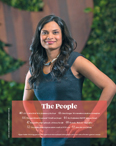Introducing Kwame Anthony Appiah
Professor of Philosophy and Law
Printer Friendly VersionWhen Anthony Appiah talks about cosmopolitanism, he could be discussing his theory for living harmoniously in a diverse world, or recounting his life story.
He is the son of a prominent Ghanaian politician and upper-crust British mother whose biracial society wedding caused an international sensation and is thought to have inspired the film Guess Who’s Coming to Dinner. He spent his youth in two privileged but very different environments in Ghana and England, moving seamlessly between them.
Appiah now lives in Tribeca with his spouse, Henry Finder, editorial director of the New Yorker, in an apartment filled with art and artifacts that reflect his many interests and travels—from Ghanaian spoons once used to weigh gold to oils by painters of the British royal court. Hosting book parties with influential writers such as Malcolm Gladwell and Adam Gopnik, Appiah is as conversant on the philosophy of language as he is on shearing sheep—and he can talk about those subjects in English, French, German, Latin, and Asante Twi.
“We live in worlds shaped by many identities—race, gender, sexual orientation, religion. I had many identities that helped cultivate my interest in managing the diversity around us,” says Appiah, a renowned philosopher who joined NYU Law this year with a dual appointment in the Department of Philosophy.
“He is the cosmopolitan citizen that he writes about,” says Amy Gutmann, Appiah’s co-author on Color Conscious: The Political Morality of Race (1998) and University of Pennsylvania president.
“He knows and appreciates many different cultures, contributes to every community of which he is a part, and is absolutely comfortable wherever he is.” Appiah is charming and disarming, New Yorker editor David Remnick says: “I would not mistake the great elegance of his carriage, conversation, and bearing for a lack of really ferocious rigor in what he writes and thinks.”
Appiah first gained widespread prominence with the publication of his groundbreaking, partially autobiographical 1992 book In My Father’s House: Africa in the Philosophy of Culture. It analyzes the misconceptions that have clouded discussions of race, Africa, and nationalism since the 19th century and asserts that race is a social construct with no legitimate biological basis.
Appiah’s ideas about identity reached their greatest expression in his celebrated 2006 work, Cosmopolitanism: Ethics in a World of Strangers. In it, Appiah sets forth a challenge: to be a global citizen with shared moral responsibilities to all of humanity, while also accepting and valuing differences in belief, color, and creed. “My slogan is: cosmopolitanism is universality plus difference.”
“I grew up in a place where people believe in witchcraft,” says Appiah. “Though I don’t, I can still be friends with people who disagree over that rather fundamental question of how the world works.” Appiah takes on his share of moral responsibility by advocating for human rights in his work with PEN American Center, where he was president, and with other organizations. In 2008 he was inducted into the American Academy of Arts and Letters. This year he joined the board of the New York Public Library.
Appiah’s father, Joseph Emmanuel, was an ambassador and occasional member of Parliament. His mother, Enid Margaret “Peggy,” was a writer who was active in the philanthropic and cultural life of Kumasi, Ghana. Joseph was related by marriage to two Ashanti kings, while Peggy could trace her blue-blooded lineage to the Norman Conquest. “My father and mother insisted that we be proud of both sides of the family,” says Appiah. “I never felt any difficulty about who we were, though other people often did.”
Growing up in Kumasi, Appiah recalls visiting his great uncle, King Prempeh II, who sat on a heavy chair and dressed in rich African togas. His family’s home, in a black upper-class neighborhood, held more books than the local library and was an obligatory stop for visiting dignitaries. When his father was abruptly jailed for sympathizing with the opposition, seven-year-old Anthony was sent to live with his maternal grandmother, Lady Cripps, in England. She was herself “a cosmopolitan thinker,” Appiah says, who had spent time in China distributing money for famine relief.
Appiah continued his education in England after his father was freed, attending exclusive private schools. As a teen, he was part of an intellectual left-leaning evangelical group that read the major 20th-century theologians and philosophers. He entered Clare College at the University of Cambridge intending to study medicine, but switched to philosophy. There he met Henry Louis Gates, who tried to recruit him to help build a black studies program in the US.
Appiah, however, earned his bachelor’s and doctorate in analytical philosophy from Cambridge and taught briefly in Ghana before joining Gates at Yale in 1981. Within the next decade, he would follow Gates to Cornell, Duke, and Harvard, where the two co-edited Africana: The Encyclopedia of the African and African American Experience and built up the W.E.B. Du Bois Research Institute, which Gates now heads. “I’ve never met a person more comfortable in his own skin and in the complexity of all that that means,” says Gates about Appiah. “Anthony’s mind is too subtle to succumb to categorizations of being black or white, Ghanaian or English. He taught me that we are all the product of multiple identities.”
In 2002, Appiah left Harvard to become the Laurance S. Rockefeller University Professor of Philosophy at Princeton University. He was drawn to NYU in part to work once again with law students, as he did while a visiting professor in 1998. He will teach a course that explores how honor—the subject of his 2010 book The Honor Code: How Moral Revolutions Happen—supports and competes with the law. Appiah plans to spend at least part of every year at NYU Abu Dhabi and NYU’s other satellite locations, and to teach jointly with colleagues abroad.
Closer to home, he and Finder spend weekends in an 18th-century farmhouse near Princeton that they share with ducks, geese, and sheep. Appiah cherishes having a respite from the city and a place for their extended family to visit. Yet ever the cosmopolitan, he says: “If I had to choose between one or the other, I would choose the city.”
—

